10-keys-to-athletic-domination-part-1
The next few keys that I feel are important for any athlete to consider are as follows.
4.) Nutrition. Without a proper nutritional plan, there is no way any athlete will perform at their peak level. Surely we could survive on hotdogs and crackers, but belly fat, back zits and man tits never helped anyone become a great athlete. A big problem here is that nutrition advice comes in many forms, and with millions of fitness gurus selling internet products that almost all seem to contradict each other. Athletes just don't seem to know what's good and what's not, partly because there is too much information and options available to them. Carbs are good, carbs are bad, eat this, don't eat that... It's all very confusing at times. Fortunately, it doesn't have to be a miserable experience trying to figure out what to eat for dinner. It's beyond the scope of this article to go into too much detail as to what exactly an athlete should be eating, but generally speaking, if your food has more that 1-2 ingredients in it, it's probably not healthy. If it has a number in the ingredient label, it's not good. Actually, if it has an ingredient label, it's probably not good. You can follow different diets such as the Zone or a paleo diet, but if you can not adhere to it, it won't work. With that being said, any athlete would benefit by sticking to whole foods such as brightly colored vegetables, an appropriate amount of quality meat, a wide variety of nuts and seeds, and plenty of fruit, all while cutting out the garbage that doesn't help us feel better after the instant gratification passes. Some research suggests that eating a balance of protein, carbohydrate, and fat with every meal can optimize hormone levels, which theoretically seems to be a great thing. I recommend trying it if you don't already.
5.) Goal setting. This is actually related to programming, but I thought it was important enough to give it its very own number. Every year millions of people set a goal or resolution to achieve something great. Unfortunately, millions fail as well. Maybe they failed to make a worthy goal, maybe they weren't dedicated, maybe they didn't have a good support system or a plan of action. So, in a sense, setting the goal might not be as important as having a plan to follow through with attaining the goal. But I know that if an athlete has a particular goal, it is much easier to derive a plan of action to do what is necessary to achieve said goal. Without the goal, the training program could simply run you in circles with no real payout. If you really want something, go get it, and don't come back til you got it. With any luck, you will have a good group of people to hold you accountable for your actions so you can't quit. But to be the best, there is no quitting, only marching full steam ahead and busting through walls to get what you are after. Set your goals high and do what is necessary to get there. Simple.
6.) Simplicity. It has been said that the lost secrets of strength and development can be found through hard and heavy basic movements. The basics can be simple to learn, but never easy to perform if done with proper technique and intensity. There are far too many programs with too many bells and whistles that have no place in most trainees programs. Pure and simple, basics work. Following a unique program for the sake of being different will likely get you little results or even injured. Especially as a novice trainee, nothing could be worse than training with too much variety, or too many variables to screw around with. Keep things simple and get big results. One of the best ways to keep simplicity in your training is to keep your brain totally out of it and follow in the footsteps of those who have had success before you. If a quality coach is going to help you do what you want to do, you would be better off listening instead of chasing your own tail.
7.) Ingenuity. Right after talking about simplicity, I bring up ingenuity. This seems to be contradictory, and maybe it is, but let me explain. Everything works, but nothing works forever. As a beginner, an athlete will see tremendous results with just a few training sessions a week of some basic movements done with quality technique. Eventually, your system will adapt and you will require greater demands to see the same types of results. Ingenuity can help shock the system and "confuse" your muscles to provoke an adaptation. This could be as simple as adding weight, adding reps, adding exercises, or decreasing rest periods to make progress. But what I am talking about here is using very creative methods for the advanced athletes to make insane increases in strength and stamina that make training plateaus something that they only hear other people talk about, but they have never actually seen themselves. Creative exercises and techniques that can get you stronger, faster, leaner and more explosive than ever before. These tactics are not only available to olympic coaches anymore, They can be available to anyone who wants to learn and be a nasty badass. But they must be applied properly to the appropriate athletes at the right times, or they are just a waste.
Part 3/3 will be coming soon. Again, feel free to share your thoughts here and share this post with your friends who might find it interesting. If these keys for athletic dominance interest you, be on the lookout for my strength and conditioning product coming out in the near future!
If you're in or near the UK, you need to check out the Strength & Conditoning for Athletic Domination Seminar I am co-hosting with Sean Keefe and Zoran Dubaic at Strength & Performance in Manchester on Saturday, May 14th, 2011. Its going to be an amazing seminar with tons of information covered from bodyweight and kettlebell training, strongman and olympic lifting, sandbags and anything else that can enhance your skills and make you a more dominant athlete!



 RSS Feed
RSS Feed